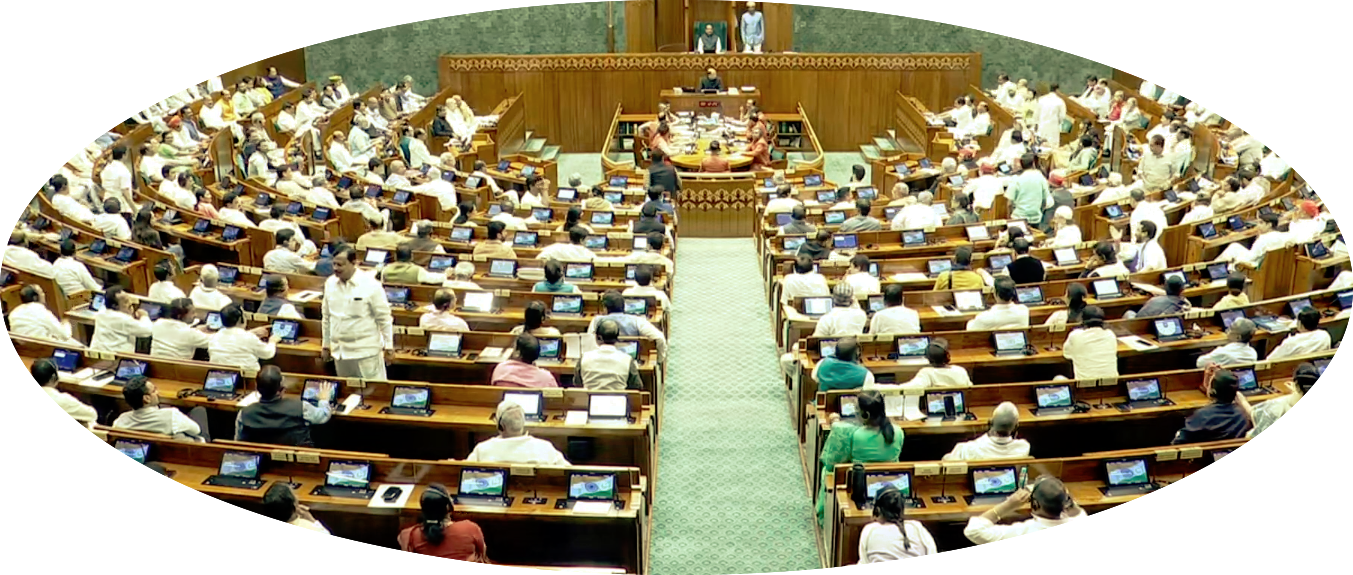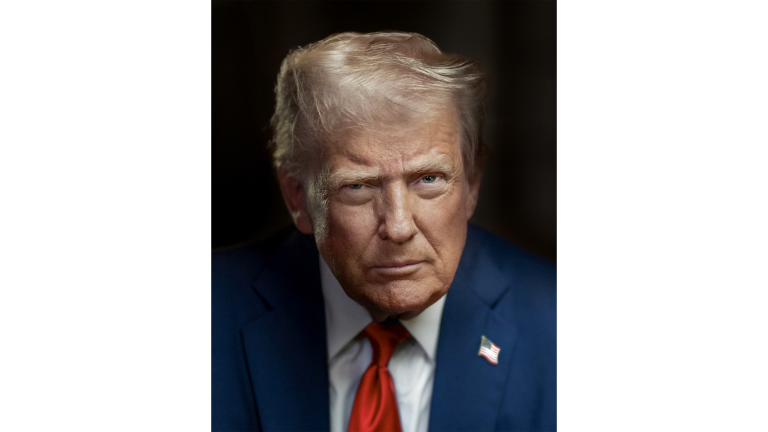
File photo of Lok Sabha proceedings. Source Sansad TV
New Delhi: The Lok Sabha today passed the Waqf (Amendment) Bill with a division of votes past midnight today, after a marathon twelve-hour-long debate. In all, 288 members voted in its favour and 232 members voted against it. The House thereafter proceeded to conduct voice votes on a range of specific amendments.
ruling National Democratic Alliance (NDA) partners, including the Telugu Desam Party and the Janata Dal (United), backed the bill, with whips issued on April 1, 2025, reinforcing the government’s position that it benefits poor Muslims by streamlining governance. The NDA has 296 MPs in the 542-member House, surpassing the required 272-vote majority.
On April 2, 2025, Union Minority Affairs Minister Kiren Rijiju introduced the bill for discussion and passage, which prompted a heated debate, where the lower house of parliament witnessed a stormy session.
The bill, renamed the Unified Waqf Management Empowerment, Efficiency and Development (UMEED) Bill, aims to amend the Waqf Act, 1995, to enhance the administration of Waqf properties. The government defended it as a transparency-driven reform, while the opposition INDIA bloc denounced it as unconstitutional, staging a walkout before the division of votes to protest what they called a “bulldozing” of the legislative process. The twelve-hour debate underscored deep divisions, with the ruling National Democratic Alliance (NDA) leveraging its majority to push the bill forward.
Rijiju opened the session at noon IST, emphasizing that the bill, shaped by the Joint Parliamentary Committee (JPC) after its August 2024 referral, addresses mismanagement with over 97 lakh petitions reviewed.
Union Home Minister Amit Shah supported it, dismissing opposition claims of religious interference. Countering opposition narratives, he clarified that any non-Muslim members appointed to the Waqf Board or its premises will not be involved in religious activities. Their role will be solely to ensure that the administration of charity-related matters is being conducted in accordance with the regulations. “No non-Muslim will interfere in your Waqf,” he assured, accusing the opposition of fear-mongering, a point he raised in JPC discussions in November 2024. He further clarified that while Waqf is a religious matter, the Waqf Board or Waqf properties themselves are not religious institutions. According to the law, a Charity Commissioner can be from any religion, as they are not managing a trust; their responsibility is to ensure that the Board operates in compliance with charity laws. Shri Shah emphasized that this is an administrative matter, not a religious one.
Shah said that the primary role of the Waqf Board should be to identify and remove those who are exploiting Waqf properties. It should focus on individuals who have leased out properties in the name of Waqf at extremely low rates for hundreds of years. He mentioned that the income from Waqf is decreasing, whereas this money should be used for the development of the minority community and to strengthen the institutions of Islam. The main task of the Waqf Board and its premises should be to stop the theft of these funds. He further stated that the opposition wants to maintain the ongoing collusion during their rule, but now, that will no longer be the case.
The opposition, with 234 MPs, walked out around 6:00 PM IST, after failing to secure amendments. Lok Sabha Speaker Om Birla’s assurance of equal amendment consideration did little to halt the opposition’s departure, signaling their distrust in the process.
Rijiju detailed the bill’s provisions, asserting it curbs corruption by removing Section 40 of the 1995 Act, which allowed Waqf Boards to unilaterally claim properties. He highlighted mandatory registration of Waqf properties on a central portal within six months and the shift of dispute resolution to district collectors, with appeals to high courts. “This is about accountability, not faith,” he said, a stance he reiterated from August 2024.
The government cited historical misuse, with Shah noting that from 2013 to 2025, 21 lakh acres were added to Waqf holdings, questioning transparency under prior Congress-led amendments.
The INDIA bloc, led by Congress MP Gaurav Gogoi, opened the opposition’s case at 12:30 pm on April 2, 2025, calling the bill an “assault on the Constitution” and Article 25’s religious freedom. Gogoi argued that requiring five years of Islamic practice for Waqf declarations discriminates against Muslims, a critique from Joint Parliamentary Committee hearings. The All India Majlis-e-Ittehadul Muslimeen (AIMIM) chief Asaduddin Owaisi, around 6:00 pm, tore a copy of the bill in the House, labeling it “divisive” and questioning non-Muslim inclusion in Waqf governance. “If no non-Hindu joins temple boards, why this here?” he demanded, echoing his August 2024 stance, before leading the walkout.
Congress MP KC Venugopal accused the government of “bulldozing” the bill without time for amendments, a grievance from the prior day’s BAC meeting walkout. Trinamool Congress’s Kalyan Banerjee and DMK’s A Raja opposed the removal of the “Waqf by user” clause and centralization of power, respectively, before joining the exodus. The opposition’s exit followed hours of protests, including slogans and placards, as Lok Sabha Speaker Om Birla extended the debate to 10:00 pm to accommodate both sides.
Deliberations and Numerical Dynamics
The bill proposes women’s representation in Waqf boards, separate boards for Bohra and Aghakhani communities, and high court appeals over Tribunal finality, aiming to resolve over 40,000 disputes. The debate, starting at noon, saw 40 amendments proposed, but the opposition claimed their 44 JPC suggestions were ignored, favouring 14 NDA-backed changes.
JPC Chairman Jagdambika Pal took the opportunity to emphasize the efforts of the JPC, asserting that it approved all recommendations made. “I provided every member ample time to put their point across,” he said.
– global bihari bureau





